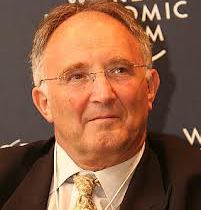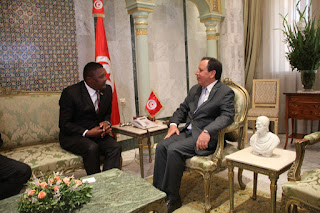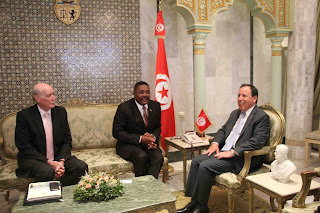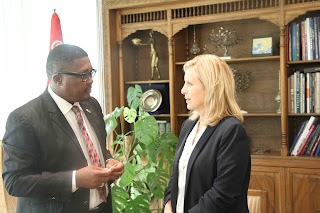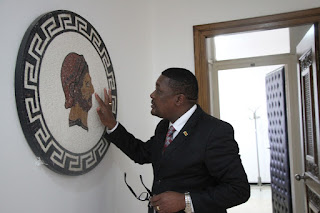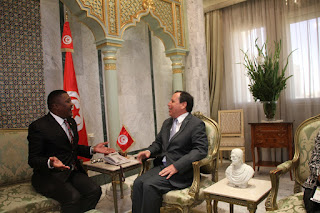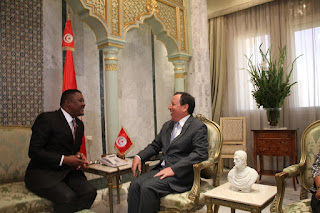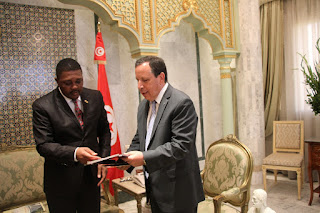
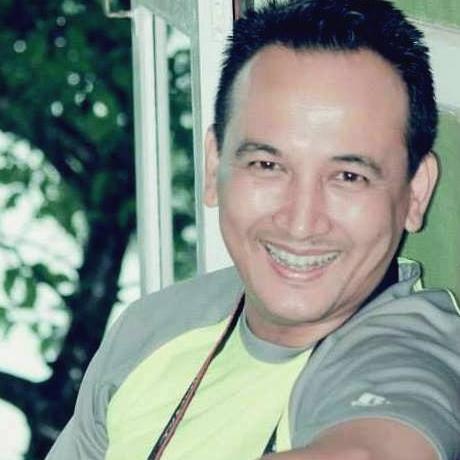
ICTP and Inclusive Tourism: World Tourism Day Initiative from Nepal
Tomorrow is World Tourism Day. This year the UNWTO event is hosted by Thailand in Bangkok. However the day is celebrate anywhere in the world.
Every year World Tourism Day has a special focus.
This year World Tourism Day is about accessible and inclusive tourism.
The chapter in Nepal for the International Coalition of Tourism Partners (ICTP) initiated by its chapter president Pankaj Pradhananga of Four Seasons Travel & Tours in Kathmandu has been working on this challenge in Nepal tirelessly.
Mr. Pradhananga told eTurboNews:
“Inclusive Tourism is a relatively new term in Nepal. Though the effort of opening up for accessible and inclusive Tourism has already begun, it is still in its infancy. A major concern for Destination Nepal is the lack of awareness and absence of mandatory law in place to encourage Tourism operating sectors for coming up with accessible Tourism products.
Given the enormous economic and social benefits to be derived from Inclusive Tourism, it is the high time for the industry to understand and develop Inclusive tourism in the gateway to Himalaya.
Nepal was struck with devastating earthquake on the 25th April 2015 which also left more than 4,000 Nepalese with physical disabilities. It is rather more important to build accessible infrastructure for the benefit of the locals as well the foreign tourists who want to enjoy Natural and cultural beauty of Nepal.
Focusing on making the state and Tourism entrepreneurs understand the importance of inclusive tourism will not only benefit the tourism industry, it will also connect the vibrant DPOs ( Disabled People Organizations) and Tourism operating sectors.
Tour operations in Social Entrepreneurship models can also empower the PWDs and also create jobs for the Assistants who also provide services to the local PWDs.
Aftermath April Earthquake, Nepal is in the process of rebuilding the nation along with its historic monuments in Kathmandu valley. A focus on Inclusive Tourism will also ensure such moments are rebuilt keeping in mind the accessibility needs of local PWDs and Elderly travelers.
ICTP and Its Himalayan chapter president, Pankaj Pradhananga is leading the initiative of Inclusive Tourism in order to help Destination Nepal to bounce back. ICTP also believes it will not only ensure responsible practices in Tourism, it will also prove to be a sustainable model of Tourism development in the long run.
The International Coalition of Tourism Partners in Nepal is extending its best wishes on the occasion of World Tourism Day with the theme Tourism for all – Universal accessibility.
More information on ICTP : http://www.ictp.travel

ICTP President: Climate Change is Existential – Act Now
Just in time for Tuesday’s World Tourism Day, Professor Geoffrey Lipman, the President of the International Coalition of Tourism Partners (ICTP) is revealing his thoughts on Green Growth, in an age of increasing Climate Realities.
He writes:
I decided to start a blog despite knowing it’s a discipline I hate. So let me say from the outset it will be spasmodic and only when there’s something important to say. And today there is.
Today, when we rightly focus on all the positive potential of Tourism for our future there is something of underlying importance to also consider . It’s about existential climate change: repeat existential. Which means if we don’t start the fix for global warming now our grandkids will freeze or fry.
I have decided to spend the rest of my working days trying to focus on that fix – and specifically how the Travel & Tourism sector can fully play its part. I am hopeful that ICTP and its Members will be leading the charge.
Fortunately, there is a chance the battle can be won. We are on the verge of a historic ratification of the Paris Climate Accord in no small measure due to the extraordinary leadership of Presidents’ Xi and Obama, both of whom understand the incredibly short time we really have, to shift away from our global carbon addiction. It is increasingly likely that ratification levels will be reached this year and that ICAO will slowly begin to manage aviation emissions next month.
This is just the start of a 3-decade carbon detox that will require a new dedication from every stakeholder, a new ability to think outside the box and new ways of doing business – investing in technology innovation and fiscal measures to spur the change.
Most importantly there is a delivery challenge – while the Global Accords and carbon reduction targets are established by sovereign states, the real action will have to be at the local community level – urban and rural – and the masses of sme’s that dominate the value chain.
The pace of change will be far greater than we can imagine now – trillions of changes in millions of places. And the stakes will be high – 12 trillion dollars of opportunity according to Bloomberg, to hit the 2-degree C stabilization mark. Much more for the 1.5 degrees C that most experts say is the real target.
When I discussed this with Maurice Strong, one of the founding fathers of modern day sustainability thinking and a friend and mentor for 20 years, shortly before he passed away last year, we talked about finding ways to take the best of climate response thinking to the grass roots of the Travel and Tourism sector. And to do so in a way that could be low cost, high impact and scalable in line with the Paris Accord. He urged me to keep up the good fight on climate change as the existential challenge of sustainable development.
SUN is the result – the Strong Universal Network – a growing community of communities, who recognize the existential nature of Climate Change and act glocally to deal with it. SUN is built on a vision of Impact-Travel – where the positive and negative elements of tourism are recognized, managed and measured coherently. It is based on Green Growth for low carbon, resource efficiency and biodiversity conservation, while strengthening jobs, inclusion and trade and “reconnecting” nature, urbanization and people. Impact-Travel embraces hyper-connectivity, technology acceleration, the internet of things and web/human interface – what the World Economic Forum calls a 4th Industrial Revolution (4IR).
With committed colleagues from around the world, we’ve begun to work on this kind of existential climate change focused, transformation system. A cloud connected network of solar powered hubs, with a smart technology platform to identify best of breed innovation, learning systems, performance enhancing tools/services, for measured and managed Impact Travel. Most importantly targeting the base of the pyramid – the community – to make sure that the change respects local culture and is inclusionary from the outset.
In future articles I’ll try to lay out how we plan to advance this during the 2017 International Year of Tourism, how we want to engage within and outside the sector and how we will outreach first to UN regions in 2018 and then globally by 2020, with Expo Dubai as a grand visible booster, to link deeply into the Paris Accord response system.
This is a start – up activity, funded to date by a small number of committed partners. Our next step is to secure impact investment to take it to breakeven level. If you are interested to be a part of this existential climate focused SUN movement, please contact Geoffrey Lipman:
[email protected]
www.thesunprogram.com
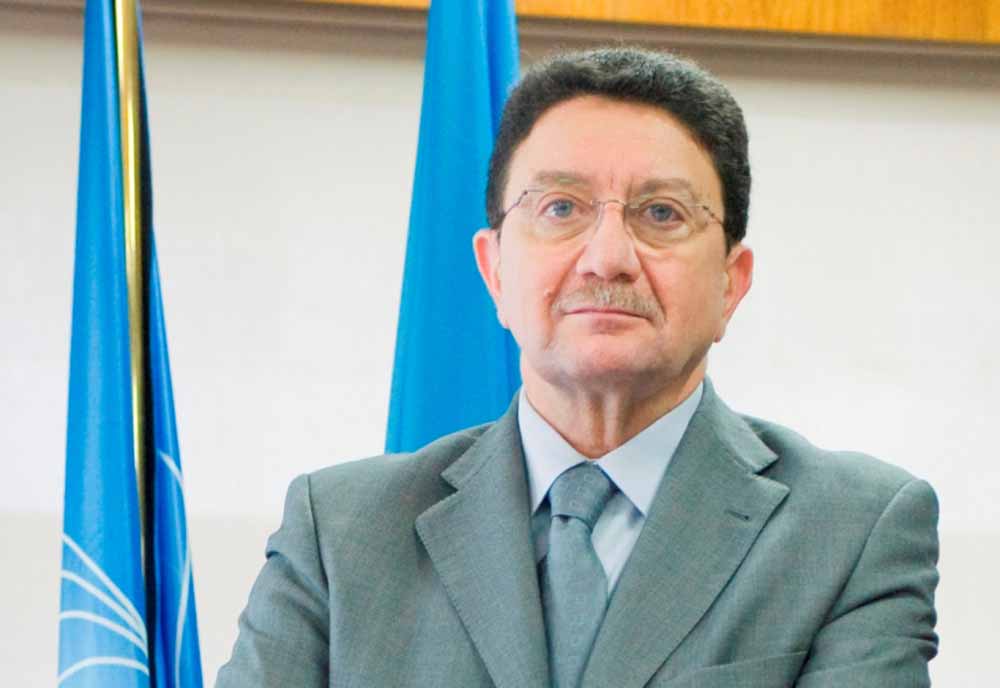
UNWTO Secretary-General Taleb Rifai: “Tourism for all!”
MADRID, Spain – Tourism has experienced a revolution in the past 50 years. In 1950 there were 25 million international tourists; today there are around 1.2 billion people travelling the world. Travelling has become a huge part of many lives.
When travelling, we come across new people, new sights, and new ideas. Often our perception of the world changes as we see more of it. However, we must not forget that for many, travelling can be quite a difficult process.
15% of the world’s population is estimated to live with some form of disability. That is 1 billion people around the world who may be unable to enjoy the privilege of knowing other cultures, experience nature at its fullest and experience the thrill of embarking on a journey to explore new sights.
Accessibility for all should be at the center of tourism policies and business strategies not only as a human right, but also as a great market opportunity.
With the world’s population ageing, all of us will benefit sooner or later from universal accessibility in tourism.
As we celebrate World Tourism Day, let us recall that all of the world’s citizens have the right to experience the incredible diversity this planet has to offer.
We thus urge all countries and destinations, as well as the industry, to promote accessibility for all in the physical environment, in transport systems, in public facilities and services and in information and communications channels.
I wish you a very happy World Tourism Day and a future full of enriching and compelling travel experiences to be enjoyed by all.
Thank you very much!

Massive endorsements for Mzembi for UNWTO Secretary General post
Zimbabwe’s Tourism and Hospitality Industry Minister, Dr Walter Mzembi is in New York for bilateral meetings with various government delegations at the United Nations General Assembly. As part of his engagements, the mercurial Minister and African Union endorsed candidate for the UNWTO Secretary General Post that falls vacant in 2017, received further endorsements at an African Travel Association Conference at New York University yesterday.
Hon Dr Walter Mzembi (MP), African Union candidate for the post of UNWTO Secretary General post
The Corporate Council for Africa (CCA) which has since acquired the Africa Travel Association (ATA), New York University academia and the African Union Deputy Commission Chairperson added their weight behind Dr Walter Mzembi’s bid to land the coveted post.
Speaking at the11th Annual Presidential Forum held annually on the sidelines of the United Nation General Assembly in New York, the President and Chief Executive Officer of CCA, Mr Stephen Hayes said “Dr Mzembi has been twice President of Africa Travel Association and he is the current Chair of the UNWTO Regional Commission for Africa with the requisite leadership competences to lead the world tourism body. He is highly qualified and has demonstrated clear policy direction for global tourism. We are proud of him as a dynamic leader with a transformative agenda that will drive sustainable tourism development. Africa, as a collective is contesting this post for the first time, and it is important that we give this Minister our full support. As CCA, we are very much behind you Walter”, Hayes said.
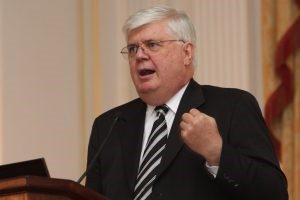
Corporate Council President and CEO, Stephen Hayes endorses Dr Mzembi
African Union Commission Vice Chairperson, Dr Erasmus Mwencha also added his voice by calling on the global tourism players and Members States to render their full support to Dr Mzembi. “I am here to talk briefly about tourism but not better qualified to do so than our Minister, my brother here Walter Mzembi whom you all heard is our African Union candidate. He is able to do it. I take him as the real deal broker we should deploy at the UNWTO. Our dynamic candidate can connect the world to Africa’s immense tourism and investment opportunities in line with our Agenda 2063 and the Africa We Want”.
During the same event, the Director of Africa House at New York University and Professor of Economics Yaw Nyarko underscored that “we are fully behind you, and if I had a vote, it is yours. You are the best and right person for the job to carry forward the legacy of the incumbent”.
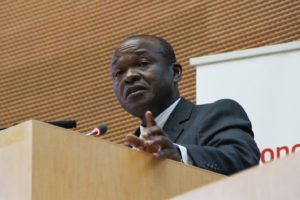
“We are joining the UNWTO as an Affiliate Organization and we will support you Dr Walter Mzembi”, said Dr Kristin M. Lamoureux who is an Assistant Dean of Tisch Centre for Hospitality and Tourism at the same University. The same sentiments were also echoed by the academia and student body at the University during an interactive session.
Notable amongst the audience were Ministers of Tourism and Environment from Namibia, Sierra Leone, Mali and Rwanda who participated later on in a Ministerial Roundtable. Also in attendance were members of the diplomatic corps, tour operators, Think Tanks and travel writers.
On his website, Dr Mzembi points says “My Vision is for a UNWTO which is responsive to Member States aspirations for a global tourism that is inclusive, integrative, tolerant, responsible, empowering, equitable, sustainable, and an effective tool for public diplomacy.”
The post falls vacant in May 2017 when incumbent Dr. Taleb Rifai’s term expires. Mzembi was appointed Zimbabwe’s tourism minister in 2009 and found his way into the UNWTO Executive Council, which plays a critical role in developing tourism worldwide. Currently he serves the organization as the UNWTO Regional Commission for Africa Chairperson, where he has acquitted himself very well. Since its inception in 1975, no African has contested the position of Secretary General of the UNWTO. It is the first time the African bloc is fielding a candidate with unprecedented unanimity. The unanimity obviously is a function of this unavoidable superiority of policy direction and his clarion call to work to improve global performance of tourism and increase its market share across all the six regions. The Secretary General is the Chief Executive of the organization, and drives the agenda of global tourism.
The UNWTO is the United Nations’ agency responsible for the promotion of responsible, sustainable and universally accessible tourism. It promotes tourism as a driver of economic growth, inclusive development and environmental sustainability and offers leadership and support to the sector in advancing knowledge and tourism policies worldwide.
Meanwhile, Bloomberg.org reports that Bloomberg Philanthropies and the U.S. Department of Commerce under President Obama’s Bloomberg Foundation/U.S. Department of Commerce’s CEO Forum, will this week also co-host the second U.S.-Africa Business Forum, a day focused on increased trade and investment between the U.S. and African nations. The other purpose of the forum is to promote Africa’s social, economic and political progresses, as well as to attract greater foreign direct investments. It is organized by the Africa Business Roundtable, in conjunction with Washington Media Group, Africa 24 TV, Eyes On Africa and Invest Africa. The forum will be attended by African Leaders and Dr. Mzembi is one of the keynote speakers during the same event. The U.S.-Africa Business Forum will build on the progress of the inaugural Forum, held during the 2014 U.S.-Africa Leaders’ Summit with the participation of nearly 50 heads of state or government and more than 150 global CEOs – to further develop trade and business opportunities between the United States and Africa. Dr Mzembi whose endorsement is gaining currency each passing day from various quotas of global tourism players will speak at the event.

A Salute to the USA
I am not an American. But on that frightful, horrendous day 15 years ago I became one mentally, psychologically and emotionally. As we all watched the carnage that was created by crazy people, doing crazy things in crazy unimaginable ways.
Like the rest of the world I mourned with my American friends, for lives senselessly lost, families plunged into the depths of despair and all the horror, shock and pain that ensued.
And like the rest of the world I got the first glimpse of the immense power of multimedia as the pictures reverberated endlessly, of machines that I had only ever associated with the good things about Travel, turned into weapons of mass destruction.
And like the rest of rest of the world I wondered about the impact on the lives, economy and mindset of a city and country that I had broadly associated mostly with the triumph of good ideas, good politics and good futures over bad.
15 years later I see that in the depths of despair and pain came the greatest moments and the seeds of new beginnings – where shattered lives were pieced together, businesses reopened, buildings replaced and hope became the driver of a new solidarity.
Yes, there were voices for lock down and a new isolationism then: for fear xenophobia and an uglier walled in America. But they were drowned in the outpour of caring and kindness from across the country and around the world.
And that spirit has prevailed through the new challenges that have emerged since 9/11 – exclusion, pandemics, migration and most significantly, climate change – a truly global existential reality. A thoughtful, understanding, inclusionary spirit that has been so decently and demonstrably led by a first African American family in the White House. An idea that could hardly be imagined 15 years ago.
America is a strong country. New York is a resilient city and good American ideas about caring, sharing and solidarity will prevail over bad ones, that are raising their heads in the frenzy of a 24/7 media-fueled realty show called an election.
As President Obama rightly said, life is about the “Audacity of Hope” and that is an ideal, well worth remembering 15 years after the first plane crashed into the Twin Towers.
Prof Geoffrey Lipman is president of the International Coalition of Tourism Partners (ICTP), a coalition of destinations, associations, media and stakeholders in 134 countries.
He is also Founder of SUN – for Climate Resilient Travel
For more information on ICTP and how to join go to http://www.ictp.travel
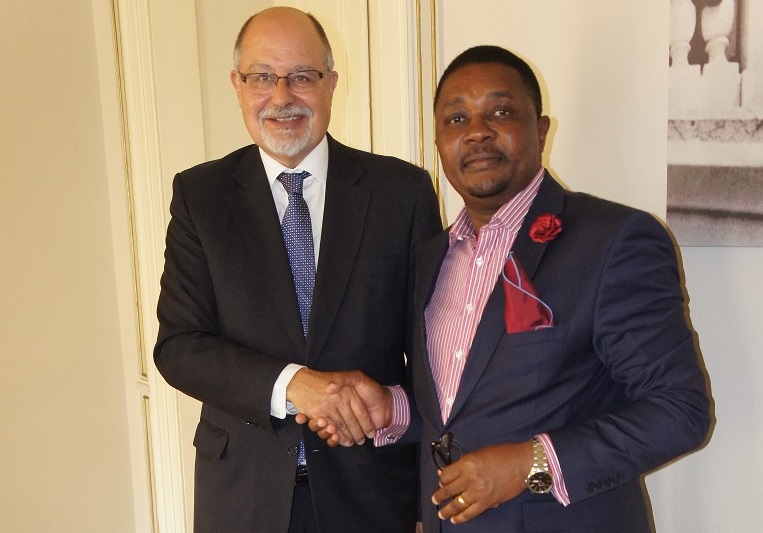
UNWTO candidate supported by the Portuguese speaking tourism world: Impressive!
UNWTO Secretary General Candidate Dr. Walter Mzembi may have just opened another door in his ambition to be called Secretary General of the United Nations World Tourism Organization. This time it was EU member country Portugal, and in a broader view the entire Portuguese speaking world.
The Zimbabwe’s Tourism and Hospitality Industry Minister is seeking the support by this European Union Country and voting member in the UNWTO Executive Council.
The current United Nations World Tourism Organization Secretary General, Mr Taleb Rifai, is due to stand down from the post at the end of 2017. Elections for his successor are due to take place when the Executive Council of the UNWTO meets in Madrid, Spain, in May 2017.
Zimbabwe’s Tourism and Hospitality Industry Minister, Dr Walter Mzembi, is in Lisbon, for meetings with senior government officials responsible for tourism policy and development of the tourism industry in Portugal.
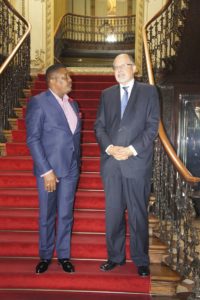
“I am here to re-connect Zimbabwe and Portugal at the level of tourism. My mission is to strengthen tourism ties between Zimbabwe and Portugal and to seek to develop strong tourism-based synergies between ourselves and the broader Portuguese speaking world”.
“With our already excellent relations with both Mozambique and Angola -fellow SADC members- and our steadily burgeoning friendship with Brazil, it is only logical that we engage Portugal, a leading European nation with long-standing, historical linkages across the globe. This includes of course the African continent, and indeed also Zimbabwe.”
Shortly after arriving in the Portuguese capital Lisbon, the Minister met with Ms Ana Mendes Godhino, Secretary of State for Tourism at her offices within the Ministry of Economy headquarters building.
Emphasizing the strong historical links between Zimbabwe and Portugal, dating back to the trading days of the Munhumutapa Empire and the excellent relations which had always existed between the two countries since Zimbabwe’s independence, the Minister and the Secretary of State concurred that there was need to build further on the existing base : and that tourism was the perfect vehicle with which to pursue this joint objective.
Tourism is currently experiencing significant growth in Portugal, as security and safety concerns continue to discourage European travelers from returning to hitherto traditional holiday destinations in various parts of the world, including a number of African destinations.
Mzembi impressed his interlocutors with the breadth of his vision, his evident knowledge of and passion for the sector and the unbridled energy he brings to the table.
It was evident from the discussions and the clear chemistry of the meetings that a strong convergence of views exists between the Minister and his Portuguese hosts with regard to the role of the UNWTO and where, moving forward, the Organization should focus its attention.
Stressing the importance of tourism as an essential component of economic development and employment creation, the Minister insisted that tourism was also an effective vehicle to build bridges between peoples of different cultures and beliefs : and a key contributor, therefore, to the promotion and maintenance of global peace.
In a separate meeting with Dr Luis Manuel Patrao, National Secretary for Administration of the governing Socialist Party and a former President of the Portuguese National Tourism Board, Dr Mzembi outlined his vision for the future development of the global tourism industry under the umbrella of the UNWTO.
Paying glowing tribute to the leadership and “enormous contribution” of incumbent Secretary General, Mr Taleb Rifai, Dr Mzembi said his intention, if elected to the post, would be, “to build upon Taleb’s enduring legacy”, and to work tirelessly to ensure that the UNWTO is accorded the recognition it fully merits within the family of UN specialized agencies.
Dr Mzembi noted the expectation of UNWTO member states that, in addition to the technical advice and support provided by the Organization, it could be doing more to foster development of the tourism sector in member countries. In this regard, innovative approaches and identifying effective synergy with other, better resourced developmental agencies of the UN family could provide a workable way forward towards meeting some of those expectations.
“Given the serious challenges which confront tourism today, most specifically the threat of terrorism, which, in recent times, has deliberately targeted tourists and tourist destinations, and from which none of us is immune. It is important, if we are to effectively address that issue and to come up with effective solutions, that those major players should be at the table and participate in the search for an appropriate and effective response.”
With this remark, Mzembi stressed the importance of growing UNWTO’s membership from the current level of 157 to match that of the United Nations itself. “ We need to aim for universality of membership and to reach out to important global players who are not members of the UNWTO, countries such as the United States, the United Kingdom and Canada. They should very seriously consider joining us”.
“Hard power responses are probably unavoidable, for sure, but soft power responses, by way of tourism promotion and building understanding and tolerance between and among people, is a valid contribution to the search for a lasting solution”.
Dr Mzembi emphasized the need to broader the current definition of “security” as it relates to the tourism industry, to include issues such as natural disasters, health pandemics and the effects of climate change – which, he noted, often impacted more heavily than terror in terms of lives lost.
“I’m really impressed”, said Secretary of State Ana Mendes Godhino.
During the two meetings, a clear convergence of views emerged on the state of global tourism and on the role of the UNWTO in addressing the challenges currently confronting the industry.
Ms Godinho informed the Minister that, in 2015, tourist arrivals in Portugal are likely to surpass the 10 million mark. Tourism already accounts for 10% of national GDP, contributing some US$ 16 billion to the economy. 8% of total employment in Portugal can be accounted to the travel and tourism industry.
The Portuguese government is finalizing a second 10 year Tourism Development Plan, to run from 2017 to 2026, which is expected to see the tourism sector become an even more important player within the overall national economy.
“We in Zimbabwe can learn from Portuguese experience and expertise in the field of tourism development. And we can certainly benefit from your specialized tourism training and language training institutes”, Dr Mzembi told the Secretary of State.
Dr Mzembi praised the Portuguese community in Zimbabwe for their solidarity with the government of Zimbabwe and for their efforts to actively promote Portuguese culture, art, music and cuisine within Zimbabwe.
“We want to work more closely with the community in Zimbabwe in their activities as an important component of our efforts to strengthen relations with Portugal and with the wider lusophone world”, said Dr Mzembi.
The Ministers agreed to expedite the finalization and signature of a bilateral Memorandum of Cooperation to give practical effect to their common determination to deepen cooperation between the two countries in the tourism sector.
From Lisbon, Dr Mzembi flies to France – another key member of the UNWTO Executive Council – for meetings with senior tourism officials of the French government.
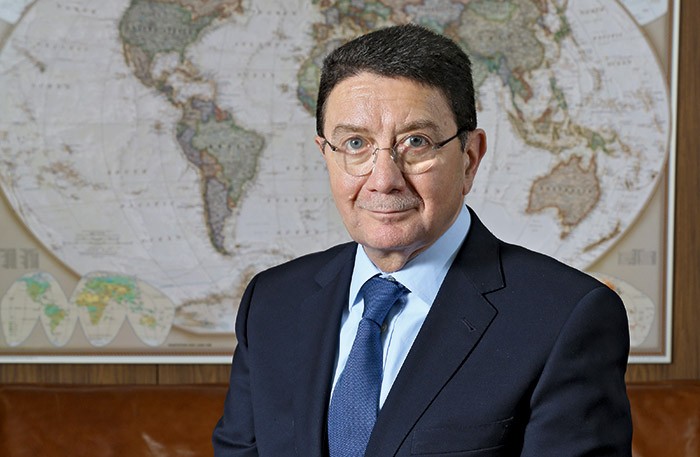
Taleb Rifai speaks out on terrorism and tourism safety
Taleb Rifai, secretary-general of the World Tourism Organization, was interviewed by Elena Sevillano, a journalist based in Madrid, home of UNWTO.
Elena points out Taleb Rifai believes the best way to respond to terrorists is to continue visiting the attacked countries.
In the exclusive interview Elena Sevillano speaks about safety, terrorism, all very real issues facing the global travel and tourism industry. Terror has made tourism to their number one target and enemy.
Jordan’s Taleb Rifai (1949), secretary-general of the World Tourism Organization (UNWTO), takes advantage of every opportunity to highlight the role of tourism as a catalyst for development and a source of wealth. In Sri Lanka, where this interview was held, Rifai stressed how this industry even helps to heal the wounds of conflict such as that experienced by this Asian country as recently as just seven years ago. The conversation, however, drifted towards what is perhaps the greatest current threat faced by the sector: terrorism.
It had been a couple of weeks since the attack at the Turkish airport; the attack in Nice occurred the day after the interview.
Question: Tourists could not go to entire areas in Sri Lanka until 2009 because of the war. How do you open up a country to tourism after a conflict?
In Asia, Vietnam and Cambodia are great examples. I am from the generation that grew up with the Vietnam War and the atrocities in Cambodia, the bloody conflict that gripped the country for so many years. No one could imagine at the time that today Vietnam and Cambodia are associated only with beautiful things. It’s amazing and it was tourism that made it happen. In Eastern Europe, we have the example of Croatia and Slovenia. Croatia was at the centre of a civil war when Yugoslavia was dissolved in the 1990s. Today it receives 12 million tourists. Today, only beaches and beautiful places come to mind: not a trace of the war.
Q: Tourists seek safety when travelling. How do you manage to transform the image as an unsafe place of a country that has suffered a war or an attack?
I always say that what matters, what is most important, is political will. If the government decides that tourism is a good thing for the country, it will go in that direction. It will work. There is no completely safe country in the world. Anything can happen anywhere. That is why the issue of security is a consideration, of course, but it is not all that is on the table. When you travel you think about how expensive, how beautiful or how attractive a place is, what experiences I’ll take back with me and also about safety. It does not determine whether you go or not. They can kill or rob you on the streets of the safest cities in the world. It should not be something that prevents destinations from promoting themselves.
Q: It is true that today something bad can happen around every corner, but now there are countries that appear regularly in the media as targets of terrorist attacks. Think of Egypt, Tunisia, Turkey. How does it affect their tourism industry and their economy?
No country should be classified as safe or unsafe forever, because anything can happen anywhere. It is a global malady.
Q: But travellers do.
That is why we must ask them to please not make that classification. Because today security is no longer something you can guarantee.
Q: Going back to these countries. It must be difficult to fight against the stigma.
Yes, unfortunately some of them have been attacked more than once and seem to have become targets of some of these terrorist groups. The effect has been always been dramatic and immediate. When something happens in a country, people stop going, but it’s a short period. Experience shows us that recovery is quick, especially in countries with a long history and experience in welcoming travellers. Turkey, Egypt, Tunisia. Does it affect them? Of course it affects them. For how long depends on them. The recovery process can be really fast. Egypt has been a tourist destination for 7000-8000 years. That may change for a few months or a few years, but it will come back.
Q: Is there an example of good practice after such an event?
: What happened in Turkey a few weeks ago was highly significant. When Ataturk Airport was attacked, two things happened that give food for thought. The Turkish authorities put the airport into operation in 8 hours, as active as ever. It was an excellent example. If you compare it to other incidents, airports were closed for days, weeks. That’s a good way to respond to terrorists. You want to hurt us? You will not succeed. We are operational in less than 24 hours. Determination and political will are key.
Russia’s reaction. We are accustomed to traditional tourism generating countries that immediately impose travel restrictions. Germany, England, France, Russia, Sweden. They tell their nationals: don’t travel to these areas. Russia did exactly the opposite. That same afternoon it lifted the ban and said we want our citizens to travel there.
Q: So, is that what needs to be done then?
: It is the best way to respond. Because—think about it—that’s what the terrorists want. They attack airports, hotels, beaches, restaurants… They attack tourist infrastructure, like it or not, because they know that is where it hurts. They cause economic and political damage because they damage the country’s image. When they do it, they expect people to stop travelling to Turkey or Egypt. So the only way to defeat them is to continue travelling to those countries. Send the message that we are back in operation. In fact, the places that have been attacked are the safest in the world right after because security is even greater. To countries I say: Please do not rush to issue advisories against tourism. Let’s not fall into that trap.
Q: Has the perception of insecurity following the attacks contributed to the tourism records of Spain?
A: I don’t agree with that approach. Our figures prove that what we are assuming, that Spain benefits from the misfortunes of others, is not correct. All the tourists lost in the three countries are no more than 2.5 million. If they all decided to go to Spain, which is impossible because they go to other places it still would not explain the growth, which is three times higher. Yes, there may be an effect, but it is not factor in why tourism is growing in Spain. To assume that Spain is doing well because others are doing poorly is unfair to Spain. Spain is performing well because it is doing a good job, not because others are suffering. Perhaps 10% or 15% of the tourists of these countries may go to Spain, but that does not explain the increase.
Q: Can we handle so much tourism? Barcelona has warned on several occasions that it has trouble managing it. Why?
First of all, you cannot say no to tourism. I think in Barcelona sufficient efforts are not being made. As a tourism destination, you have to create other attractions that pull tourists from the city centre, give them alternatives, create new destinations. Barcelona can do better, and I hope this is not understood as a criticism.
Q: How is Ana Botella working in your organization after you took her on board?
Very well. She is a very active person and did a lot for the tourism sector when she was mayor. I did not recruit her due to political affinities but rather for her enormous experience.
: Has she already produced a report?
Yes, and she is preparing a meeting of the network of mayors of tourism cities.
“We live in the era of travel,” you said at the conference in Sri Lanka. How does that translate into figures?
In 1950, after the end of World War II, and when the world was beginning to go back to normality, there were only 25 million international travellers crossing borders, according to our data. In 2015 we counted 1.184 billion. We are talking about 65 years over which we can see how much the number of travellers has multiplied. It’s tremendous. People are defying borders and travelling more and more. And it is not just the numbers, it’s the places. There is no longer any place that people do not travel to. We travel to the North Pole, the South Pole, the Amazon, deserts. The world has opened up in an incredible way. And it happened so fast that we are still adapting. It is something like what happened with the industrial revolution, 200-250 years ago. People were not aware of living in that era until a hundred years later. I am sure that in 40, 50, 60 years people will look back and characterize our time as the era of travel.
I think, historically, this is the time for people to move. Before, it was things that moved, trade was created, after that capital moved, with the creation of financial institutions, then information, now is the time for people to physically move, which is why I call it the era of travel.
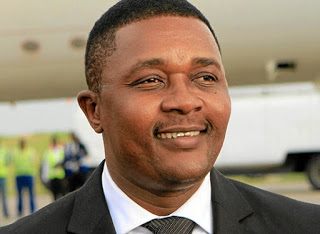
UNWTO Africa Chair Mzembi reaches out to Italy’s minister of cultural heritage and tourism
The earthquake today was very much a shock and strike against the travel and tourism industry in Italy during the peak of their high season travel period.
The outspoken candidate circling the Earth to become the next UNWTO secretary general is showing global leadership again today. Walter Mzembi, who also is the current chair for the UNWTO Commission for Africa (CAF) took the initiative while attending an event in Kenya to reach out to the people of Italy and their tourism industry leaders.
He had a letter delivered to His Excellency Dr. Dario Franceschini today, following the devastating earthquake claiming more than 120 lives in Central Italy.
The letter reads:
His Excellency Dr Dario Franceschini
Minister of Culture and Tourism
Ministry of Culture and Tourism
Via dell Collegio Romano
27 Roma 00186
ITALY
Your Excellency,
I write, on behalf of all members of the UNWTO Commission for Africa (CAF) – which I have the honour to Chair – to extend to you our collective heartfelt sympathy and most sincere condolences for the tragic loss of life and terrible injuries inflicted upon the Community of Amatrice and many other towns and villages within the Umbria region of Central Italy, following the devastating earthquake of 23 August.
No words can bring adequate comfort to those who have lost loved ones or whose homes and livelihoods have been destroyed by this disaster, but please know that you are all in our thoughts and prayers at this most challenging and difficult of times.
You will recall, Excellency, during the 60th Regional Commission for Europe, I highlighted, on behalf of Africa, the need to expand the definition of insecurity to include natural disasters of different kinds prevalent in our different regions – which often claim more lives than conventional threats such as terrorism – and, in this regard, the need for us to adopt a holistic mitigation strategy.
In the hope of meeting you again in the near future and of continuing our discussion on the search for effective mitigation solutions, I once again extend my deepest condolences and sympathies to all those affected by the recent earthquake.
Please also accept, Excellency, my most sincere best wishes.
Yours faithfully,
Walter Mzembi (Phd)
Minister of Tourism and the Hospitality Industry
Republic of Zimbabwe
Chairperson
UNWTO Commission for Africa
c.c. Her Excellency Dr Dorina Bianchi
Deputy Minister of Culture and Tourism
Ministry of Culture and Tourism
Rome – Italy
c.c. His Excellency Dr Enrico de Agostini
Ambassador of the Republic of Italy
Harare – Zimbabwe
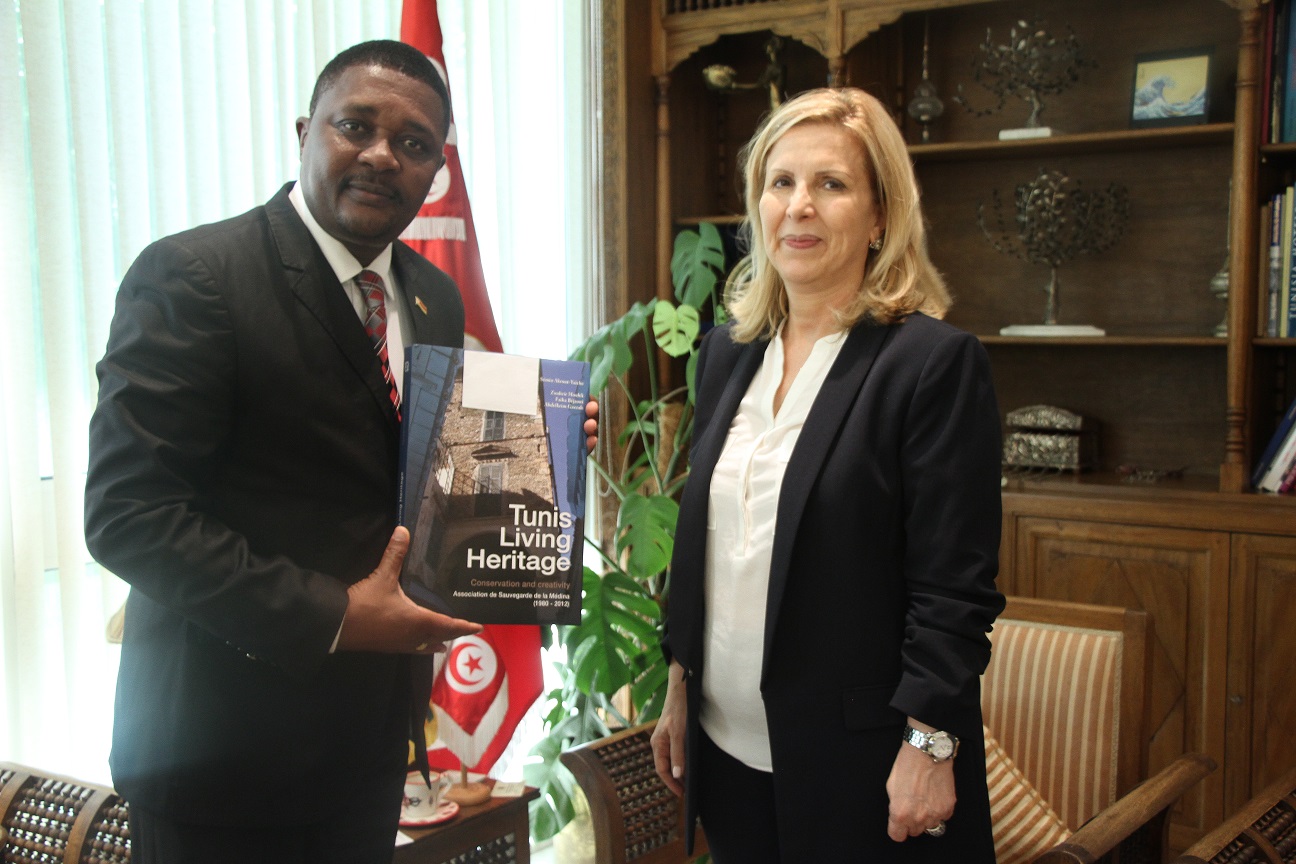
UNWTO candidate Mzembi leaves Tunisia deeply impressed
Tunisia is deeply impressed by Mzembi’s vision for global tourism development.
Hot on the heels of his successful two-and-a-half-day visit to Egypt earlier this week, Zimbabwe Tourism Minister Walter Mzembi has brought his UNWTO campaign effort to Tunis, capital city of the Republic of Tunisia – the latest stage of his current outreach program.
Like Egypt, Tunisia is also a member of the UNWTO Executive Council. Its support, therefore, will be crucial come election-day in May 2017, when the Council gathers in Madrid, Spain, to decide who will become the next Secretary General of the organization when the incumbent, Dr. Taleb Rifai a Jordanian national, stands down.
Warmly welcomed by his Tunisian hosts, Dr. Mzembi first met with the Minister of Foreign Affairs, Mr. Khemais Jhinaoui, who was accompanied by senior officials from the Political and Economic Affairs Departments of the Ministry.
Tracing the evolution of the fraternal relationship which exists between Tunisia and Zimbabwe, Minister Jhinaoui expressed his delight at receiving Dr. Mzembi and welcomed the opportunity for a detailed exchange of views focusing on how the two countries could work together in the future to further strengthen already existing ties, including the tourism sector.
Minister Jhinaoui congratulated Dr. Mzembi on the progress made thus far with regard to his bid to secure the post of Secretary General of the UN World Tourism Organization, and noted the strong boost given to that bid by the recent AU-Summit endorsement of his candidature.
Minister Mzembi gave a detailed presentation of his vision for the future trajectory of the UNWTO should he be elected to the post of Secretary General. Both ministers agreed on the positive impact his election would have, not only in terms of mainstreaming tourism within the continental African development agenda but, more broadly, in terms of injecting fresh impetus and focus on addressing the serious challenges which, today, confront the global tourism industry.
Minister Jhinaoui complimented Dr. Mzembi for the depth and clarity of his vision and for the evident passion and dynamism underpinning that vision. He said he would immediately share the substance of their discussion with the Tunisian Prime Minister and the Head of State, His Excellency, President Beji Caid Essebsi.
The two ministers agreed to keep in close contact as the UNWTO election process enters the formal nomination phase, leading towards the primary vote to be cast by the by the 32 Executive Council members when they meet in Madrid, Spain, in May 2017.
Later in the day, Hon. Minister Mzembi met with his Tunisian counterpart, Ms. Salma Elloumi Rekik, the Minister of Tourism and Handicrafts.
He warmly congratulated her on her re-appointment, just the previous day, to the Tourism and Handicrafts portfolio – the first African colleague to do so.
The two ministers agreed that every effort should be made to pursue the path of greater cooperation between Tunisia and Zimbabwe, in the tourism sector. As an immediate next step and so as to set out a concrete basis for such intensified cooperation in the sector, the ministers agreed to rapidly finalize the Memorandum of Understanding (MOU) they originally initiated in 2014.
The ministers then held detailed discussions on the current status of global tourism, highlighting the various challenges which confront the industry today and agreeing on the important role UNWTO must continue to play in mobilizing and coordinating the international response to those challenges.
The ministers spoke at length about the current and future development of tourism on the African continent and of the need for African countries to intensify their efforts, at the national, regional, and continental level, to ensure that in each country and, more broadly, within the AU’s Agenda 2063, “Tourism” is accorded its rightful status as a powerful engine for rapid, effective socio-economic development across the continent.
With specific regard to Tunisia, the ministers noted the serious impact recent terror attacks and the resultant heavily negative travel advisories had had upon foreign tourist arrivals, especially from Tunisia’s traditional source markets in western Europe.
Dr. Mzembi agreed that finding an effective approach to the issue of tourism and security was absolutely essential to the future well-being and development of global tourism. It counts not only as a vehicle for more inclusive socio-economic development, but as an effective tool to build bridges between peoples and cultures, to promote greater international understanding, and to contribute towards global peace and harmony.
“In order to fulfill its true destiny, UNWTO needs to be fully universal in terms of its membership. A number of major players remain outside the organization. We need them inside with us, especially if we are serious about promoting a meaningful discussion and seeking effective solutions to the burning issue of the day – that of tourism and security and related issues such as unilateral, unfair, and often excessive travel advisories which can have a devastating effect upon tourism, especially in developing countries,” said Minister Mzembi.
Minister Rekik expressed her appreciation for the vision outlined by the mercurial engineer in terms of the development of the global tourism industry and confided that her colleague, the Foreign Minister of Tunisia, had telephoned her immediately after his meeting with him to record how impressed he had been with the clarity and farsightedness of the minister’s vision, should he be elected to the post of Secretary General, to continue and build upon the fine legacy of Mr. Taleb Rifai.
From Tunis, Hon. Minister Mzembi travels to Nairobi, Kenya, venue for the 6th Tokyo International Conference on African Development (TICAD VI) where he will have an opportunity to engage and interact with a range of African Heads of Delegation as well as with senior officials of the Japanese Government.
Held every three years and alternating between Japan and the African continent, the TICAD forums provide an opportunity for African leaders to engage directly with the political leadership of Japan and, in coordination with the African Union Commission, the UNDP and the World Bank. All of them are TICAD co-organizers. The minister is seeking to align Japanese development support and, wherever feasible, Japanese private sector engagement (itself often supported by or supplemented by Japanese Government funding) with Africa’s agreed continental development agenda(s) across a variety of sectors.
Since TICAD IV (Yokohama, 2008), tourism development has been a sub-pillar of Japan’s broad cooperation matrix with African countries.
Japan, like China and a number of other Asian countries, is actively promoting out-bound tourism and, via institutions such as the Japan Tourism Agency and JATA, is seeking new, secure and safe travel destinations for its nationals. Africa certainly features in Japan’s considerations, and TICAD provides an appropriate and effective platform for a collaborative dialogue towards realiing the undoubted potential of greater tourism exchanges between Japan and Africa.
Zimbabwe, which already benefits from a steady flow of tourist arrivals from Japan, albeit almost entirely focused on the Victoria Falls, is well placed to take advantage of Japan’s focus on out-bound tourism and the possibilities of enhanced Japanese financial and technical support, via TICAD, for tourism development.
In addition to seeking the endorsement of the Japanese Government for his UNWTO election bid, Hon. Minister Mzembi will be seeking to encourage further Japanese tourist travel to Zimbabwe.
With its impressive and varied tourist product and given the general peace and tranquillity which prevails across the entire country, and given also the burgeoning relationship between Japan and Zimbabwe – evidenced by the invitation extended by Prime Minister Shinzo Abe to His Excellency President R.G. Mugabe, to make an official visit to Japan in March this year – it is expected that this third and final leg of Dr. Mzembi’s current travels will prove to be as successful as the first two have been.

Global tourism resilient to terrorism, Brexit and further macroeconomic challenges
Global Travel & Tourism continues to register strong growth despite challenges from terrorism, political turmoil, global economic developments, and the Brexit decision, according to new research by the World Travel & Tourism Council (WTTC).
The update of WTTC?s Economic Impact Reports 2016 shows that, despite the many challenges Travel & Tourism has faced in the first six months of 2016, the sector is still expected to grow by 3.1%, outpacing global economic growth forecast at 2.3%.
The regional outlook for direct Travel & Tourism GDP in 2016 shows that:
- South Asia leads the growth at 5.9%, driven by strong economic prospects in India.
- Latin America will be the worst performer, with an anticipated decline of 0.9%, driven by weakness in Brazil.
- Northeast Asia and Southeast Asia are expected to show solid growth at 4.7% and 4% respectively, stimulated by China growing at 6.3%.
- North America will perform well, with forecast growth of 3.1%.
- Europe will be challenged by lower visitor spend, but will still grow by 2.2%.
While the global picture remains positive, the outlook for some countries has deteriorated since WTTC?s last forecast in March 2016:
- In France, the sector?s direct contribution to GDP is still growing, but the forecast has been reduced from 2.9% to 1.1%, due to macroeconomic downgrades in other European countries, and compounded by the recent incidents in the country, including the atrocity in Nice.
- In Turkey, growth in Travel & Tourism?s direct contribution to GDP has been reduced further from -0.2% to -3.2%, due to the spate of terror attacks, the diplomatic dispute with Russia, the failed coup, and proximity to the Syrian conflict.
- In Brazil, thesector is still expected to contract, despite the positive effect of the Olympics. Growth has been downgraded from -0.9% to -1.6%, as a result of the political turmoil and weak macroeconomic performance.
The report includes a focus on the impact of the Brexit decision. This shows that Travel & Tourism in the UK is expected to hold up well in 2016 with growth of 3.6%. Weaker domestic spending growth, and a projected drop in UK outbound holidays of 3%, will be offset by higher spending in the UK by international visitors as a result of the favourable exchange rate.
David Scowsill, President & CEO, WTTC, said: ?Our update report highlights the resilience of travellers and the robustness of our sector, as tourism continues to outpace global economic growth by nearly 1%. Whilst we should not downplay the impact of incidents or turmoil at individual country level, on a macro-economic level we continue to register strong growth.
It is important to remember that tourism is a force for good. It brings tremendous social and economic benefits to countries and connects people from different cultures and backgrounds. We call on governments to continue to focus on the economic and social benefits of Travel & Tourism, and to work together with the private sector to combat some of the challenges we face.?



